|
|
| | |
 |
|
|
|
|
Tuer un oiseau hier avec une pierre prise aujourd'hui
Exposition individuelle
Du 11/01/2023 au 17/02/2023 à Stuttgart
Pour faire de la peinture, je me sers de beaucoup de choses d'aujourd'hui et d'hier, par example l'histoire de l'art,le cinéma, la photographie, la danse, le sport, mais aussi de ma memoire.
Lieu : L'institut français
https://www.institutfrancais.de/fr/stuttgart
|
|
|
|
|
|
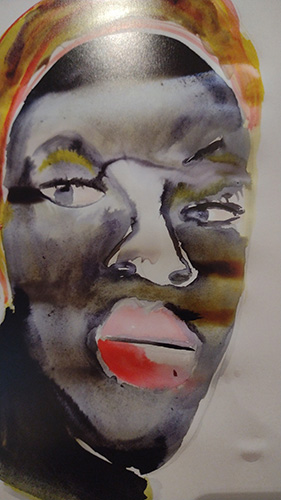 |
|
 |
|
|
|
|
Rencontres photographiques de Bamako
Conférence, performance, événement...
Le 20/10/2022 à Bamako
artistes pour prolonger la période de soumission des candidatures à la biennale, et prenant compte des conditions sociopolitiques et sanitaires auxquelles nous sommes actuellement confrontés dans le monde, l’édition de cette année des Rencontres de Bamako – Biennale Africaine de la Photographie sera reportée à 2022. Cette décision difficile, mais nécessaire a été prise priorisant la santé et le bien-être des artistes, de l’équipe et des visiteurs de la biennale. Intitulée Maa ka Maaya ka ca a yere kono – Multiplicité, Différence, Devenir et Patrimoine, la 13ème édition des Rencontres de Bamako se déroulera désormais du 20 octobre 2022 au 20 décembre 2022, dans divers lieux de Bamako, au Mali.
Conçue en collaboration par le Directeur Général Cheick Diallo, le Directeur Artistique Bonaventure Soh Bejeng Ndikung et l’équipe de commissaires – Akinbode Akinbiyi (artiste et commissaire indépendant), Meriem Berrada (Directrice Artistique, MACAAL, Marrakech), Tandazani Dhlakama (Commissaire Adjointe, Zeitz MOCAA, Cape Town), et Liz Ikiriko (artiste et Commissaire des Collections et Chargée de Médiation à la galerie d’art de l’université York, Toronto) – cette édition de la Biennale sera de nouveau un lieu privilégié de rencontres d’artistes du monde africain.
Les Rencontres de Bamako rendront hommage aux espaces de l’entre-deux, à ce qui défie la définition, aux phases de transition, au fait d’être ceci et cela ou ni l’un ni l’autre, au devenir, à la différence et à la divergence dans toutes leurs nuances. Ainsi, la déclaration d’Amadou Hampâté Bâ (Aspects de la Civilisation Africaine, Éditions Présence Africaine, 1972) est la ligne directrice de cette manifestation, Maa ka Maaya ka ca a yere kono, se traduisant par « les personnes de la personne sont multiples dans la personne ».
Nous vous invitons particulièrement à lire le concept des prochaines Rencontres de Bamako ici.
Appel à candidatures et liste des artistes
Cette édition des Rencontres de Bamako se concentre sur les questions de multiplicité, de processus, de transition, de devenir, de patrimoine et de différence. Admettant que les discussions actuelles autour de la singularité tendent à figer les notions d’identité, de culture et de politique, l’équipe de commissaires avance une puissante affirmation de ce qui se trouve entre et au-delà des frontières traditionnelles de ces catégories.
Nous avons invité des artistes à réfléchir aux processus de devenir, aux multiplicités, aux identités stratifiées et fragmentées, aux compréhensions palpitantes de l’héritage/des patrimoines, des récits et des différences.
Lieu : Musée d'art moderne de Bamako
https://www.rencontres-bamako.org/index.php/la-13e-edition-des-rencontres-de-bamako/
|
|
|
|
|
|
|
|
 |
|
|
|
|
Residence de 6 mois
Conférence, performance, événement...
Le 03/04/2022 à Paris
Résidence de 6 mois.
Lieu : Cite internationale de Paris
https://mwk.baden-wuerttemberg.de/de/service/presse-und-oeffentlichkeitsarbeit/pressemitteilung/pid/land-foerdert-hochbegabte-kuenstlerinnen-und-kuenstler-mit-stipendien-fuer-aufenthalt-an-der-cite-intern/
|
|
|
|
|
|
|
|
 |
|
|
|
|
Routes of Empathy
Exposition collective
Du 08/10/2021 au 06/11/2021 à Berrlin
The group exhibition Routes of Empathy presents artistic positions whose works deal with theempathic in the artistic process on different levels. The basis of all empathic action is a form of "being touched": it is the ability to put oneself in the physical and/or emotional position of one's counterpart without pursuing one's own interests. This empathic state is often hindered by conflicting economic policies and the abuse of power. As a result, empathic action increasingly shifts into the realm of the precarious or is even entirely faked in order to pursue one's own economic interests.
The exhibition expands on the view of artistic activity as a social activity. Routes of Empathy addresses the question to which extent the body, politics, and empathy are intertwined. In doing so, both a positive side that nourishes society, its creative and subversive potential and possible negative sides in the context of the abuse of power and strategic action are made visible. What position can empathy have, specifically in terms of shaping the body in the wake of profound, international, and biopolitical actions taken during the global pandemic?
From a number of different perspectives, the artists in the exhibition address the empathic in a society in which physical proximity is fraught with danger and the human aura may no longer be influenced or even touched. With the ability to "put oneself into the state of the other person", the artists show how the current situation can be responded to artistically.
In the context of performances, screenings, and lectures by the participating special guests Teboho Edkins, Hanna Hennenkemper, Mohammed Laouli, and Sandra Man, the exhibition will evolve during its duration and will be complemented further by a series of interviews conducted by Stella Geppert with the social ethnologist Dr. Stefanie Bognitz and the philosopher Dr. Susanne Schmetkamp, focusing the view of the conceptualities and artistic considerations of the project.
Lieu : frontviews
https://www.frontviews.de/exhibition.php?exhibition_id=92
|
|
|
|
|
|
|
|
 |
|
|
|
|
Fluids boundaries
Conférence, performance, événement...
Le 03/09/2021 à Barcalona
The project Frontières Fluides, fluid boundaries, which has been running since 2013, focuses on migration and transit movements between Europe and North Africa to question the cultural, social, and economic effects of colonialism and the European migration policy. The aspects of voluntary or involuntary nomadic life are symbolized by a boat. A temporary place of residence that is unstable, shaky, and by no means protected.
In addition to the moment of transit, the handling of boundaries as part of the everyday life of migrants and artists is equally important for Katrin Ströbel and Mohammed Laouli. To cross, overcome, and accept them, as well as to make them visible is always considered in the works. Ströbel and Laouli criticize the conditions of the travels and simultaneously visualize the omnipresence of the boundaries.
Lieu : Hangar.org Art Residency
https://hangar.org/en/residents/activitats-dels-residents/tallers-oberts-poblenou-2021/
|
|
|
|
|
|
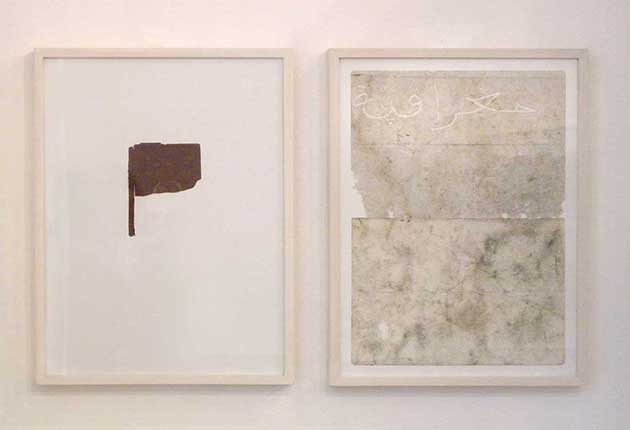 |
|
 |
|
|
|
|
Echoes Of Empire : Contemporary Art And Colonial History
Conférence, performance, événement...
Le 28/05/2021 à Marseille/Bristol/Cape Town
Dans de nombreuses villes européennes et africaines, des artistes, des activistes et des praticiens du patrimoine ont tenté de composer avec les controverses soulevées par la mémoire et le traumatisme des histoires coloniales et de la traite des esclaves. Comme en témoigne le renversement de la statue d'Edward Colston à Bristol au cours de l'été 2020, dans le sillage de Black Lives Matter, les signes d'un passé exprimant un récit identitaire nationaliste et violent sont de plus en plus contestés. Suscitant une profonde réticence de la part de certains artistes, activistes et de conservateurs de musées, les traces coloniales sont devenues des points de mobilisation pour étudier les moyens de décoloniser les monuments, les espaces urbains ainsi que la mémoire. Qu'ils soient actifs au sein de musées ou d'associations, qu'ils agissent de manière collective ou individuelle, les artistes et activistes contemporains utilisent les traces coloniales - les objets, les sites, les monuments - afin de réinterpréter les anciennes relations culturelles asymétriques entre métropole et colonie. Quel est le rôle des artistes et des conservateurs dans la réécriture de ces mémoires nationales et conflictuelles ? Dans quelle mesure un patrimoine dissonant peut-il être recadré de manière collective ? Quelles relations sont établies par les interventions des artistes autour des pratiques commémoratives entre le passé et le présent ?
Lieu : Universite Renne2/Zoom
https://echoesofempire.sciencesconf.org/
|
|
|
|
|
|
|
|
 |
|
|
|
|
Moroccan Trilogy 1950-2020
Exposition collective
Du 31/03/2021 au 27/09/2021 à Madrid
Moroccan Trilogy 1950-2020 articulates a visual dialogue that reflects artistic production at three historical moments from independence to the present day. It does so through a significant selection of artworks that show the diversity of initiatives, the vitality of artistic debate and the interdisciplinary exchanges to be found in Morocco.
This exhibition falls within the area of decolonial research, one of the central focuses of the Museum’s programming. It is a first attempt to broaden the focus of these analyses by turning the gaze onto the southern shore of the Mediterranean, the cradle of western civilization, and more specifically onto Morocco, an ancient country just 14 kilometers away from Spain.
The show has been organized within the framework of the program for cultural cooperation between Spain and Morocco in the field of Museums, an initiative fostered by the National Foundation of Museums of the Kingdom of Morocco and the Ministry of Culture and Sport of the Government of Spain, in collaboration with Mathaf: Arab Museum of Modern Art in Qatar. Moroccan Trilogy 1950-2020 offers an account of artistic experiences in Morocco from the mid-20th century onwards, focusing particularly on the three urban centers of Tétouan, Casablanca and Tangier. The works on show, produced between 1950 and 2020, combine with archive documents to illustrate a history of profuse cultural effervescence.
Lieu : Museo Nacional Centro De Arte Reina Sofía
https://www.museoreinasofia.es/en/exhibitions/moroccan-trilogy
|
|
|
|
|
|
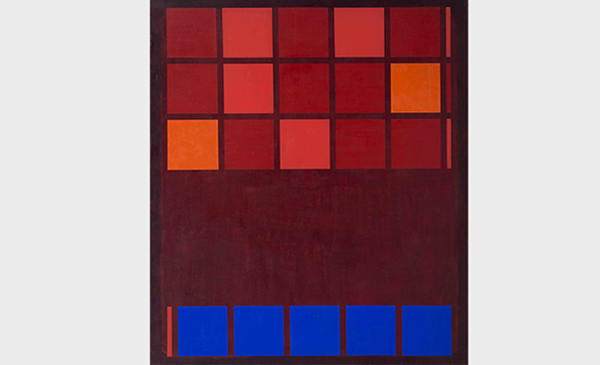 |
|
 |
|
|
|
|
Resist, Die Kunst des Widerstands
Exposition collective
Du 29/01/2021 au 11/07/2021 à Cologne
RESIST! Illuminates 500 years of anti-colonial resistance in the Global South and tells about colonial violence and oppression and its continuities. The exhibition pays homage to the women and men who resisted in the most diverse ways and whose stories have hardly ever been told or heard to this day.
In a labyrinthine, futuristic architecture of pipes, beams, stones and steel elements, designed by the architects raumlaborberlin raumlaborberlin
, the works of over 40 contemporary artists from the Global South and the diaspora tell stories of rebellion and war, violence and trauma as well as survival and resilience. Their stories are complemented by historical documents and numerous objects from the RJM collection, silent witnesses of moments of anti colonial resistance. Within this labyrinth, 4 curated autonomous rooms, the so-called “It’s Yours!” rooms open up further perspectives: The Nigerian artist Peju Olowu Layiwola
deals with the looted arts from the Benin Kingdom (Nigeria), of which there are also many in the RJM collection, and invited other Nigerian artists, musicians, poets and cartoonists widening her perspective.The Namibian activists Esther Muinjangue
, and Ida Hoffmann tell the genocide of the Herero and Nama in Namibia, the first genocide of the 21st century. The Hungarian curator Timea Junghaus
has invited Sinti and Roma artists, biggest minority in Europe who emphasise the embodiments and narratives of Sinti and Roma resistance as a central aspect of their own experience. Finally, the Cologne postmigrant association In-Haus e.V.
laments racism and colonial continuities.
Dance and music of resistance becomes a place in the exhibition thanks to Rokia Bamba
, sound artist and DJ who develops a sound and voice archive of resistance, and to the urban dance choreographers Bahar Gökten
and Daniela Rodriguez Romero Art Directions
who explore embodied resistance.
Numerous participatory formats such as repair and writing workshops, storytelling cafés, a growing “Library of Resistance” and live speakers with whom visitors can engage in dialogue offer a platform for critical examination of colonialism and its continuities and also create spaces for discussions, listening, networking, being together and solidarity.
Curators of the Autonomous Spaces “It’s Yours!”
Esther Utjiua Muinjangue & Ida Hoffmann, Peju Layiwola, Tímea Junghaus, Integrationshaus (In-Haus e.V.) Cologne-Kalk with Elizaveta Khan, Mona Leitmeier, Sae Yun Jung, Salman Abdo and Rita Bomkamp
Artists in Residency
Rokia Bamba (Music), Bahar Gökten & Daniela Rodriguez Romero (Urban Dance), Kiri Dalena
(colonial Photography), Francis Oghuma
(Real Time Documentary)
Participating Artists
Florisse Adjanohoun, Christie Akumabor, Osaze Amadasun, Kader Attia
, Roger Atikpo, Belkis Ayón, Marcel Djondo, Omar Victor Diop, Nwakuso Edozien, Robert Gabris
, Jimga Jimoh Ganiyu
, Anani Gbeteglo, Ayrson Heraclito
, indieguerillas, Patricia Kaersenhout
, Eustache Kamouna, Grada Kilomba
, Mohammed Laouli
, Alao Lukman, Peter Magubane, Dhuwarrwarr Marika, Tshibumba Kanda Matulu, Medu Art Ensemble, Luiza Prado
, Małgorzata Mirga-Tas, Keviselie/Hans Ragnar Mathisen, Monday Osaigbovo Agbonze
, franky mindja, Gaëtan Noussouglo
, Lapiztola
, Nura Qureshi, Emília Rigová, Mamadou Sall, Juan Manuel Sandoval, Diego Sandoval Ávila, Selman Selma
, The Singh Twins
, Alfred Ullrich, Huỳnh Văn Thuận, Edward Venero, Kara Walker
, Wantok Musik
, Tania Willard, Lawrence Paul Yuxweluptun, Ernesto Yerena
Project management
Lydia Hauth
and Agustina Andreoletti
The Project is supported by
Kulturstiftung des Bundes
, Peter and Irene Ludwig Foundation, Rolff F. Victor Stiftung
, Bundeszentrale für politische Bildung (bpb)
, the Museum Society and the 360° Fund for New City Cultures programme of the German Federal Cultural Foundation. The “360° Fund for New City Cultures” programme of the German Federal Cultural Foundation.
Deutschlandfunk
is the media partner of the exhibition.
Lieu : Rautenstrauch-joest-Museum
http://www.rjm-resist.de
|
|
|
|
|
|
|
|
 |
|
|
|
|
Twist, des creatif pour un monde meilleur
Conférence, performance, événement...
Le 13/12/2020 à Allemagne/France
500 ans de colonialisme, ce sont aussi 500 ans de lutte contre l’impérialisme. Tel est le thème de l’exposition "Resist!" organisée par le Rautenstrauch-Joest Museum de Cologne. L’inauguration prévue en novembre a dû être reportée en raison de la crise sanitaire. "Twist" a pu toutefois visiter l’exposition en avant-première, aux côtés de la directrice du musée Nanette Snoep, pour vous en dévoiler quelques œuvres saillantes.
"Resist!" est un hommage à celles et ceux qui se sont rebellés d’une manière ou d’une autre contre l’impérialisme, et dont l’histoire est méconnue. Elle donne notamment à voir les œuvres d’artistes contemporains, tels Singh Twins, deux Britanniques d’origine indienne qui ont consacré un triptyque au massacre d’Amritsar au Penjab en 1919, lors duquel l’armée impériale a réprimé dans le sang une manifestation pacifique.
À Marseille, dont une partie de la population a des racines dans les anciennes colonies et protectorats français, Romy Straßenburg rencontre l'artiste marocain Mohammed Laouli. Ses vidéos, photos et installations traduisent depuis des années ses réflexions critiques sur la migration et le colonialisme.
Lieu : Arte tv
https://www.arte.tv/fr/videos/095820-009-A/twist/?fbclid=IwAR3MqdFwzz1VI4i0B-rqHT-vN9APWi-YnjU-rZzoi4tQQNt0MhBCIPo99U4
|
|
|
|
|
|
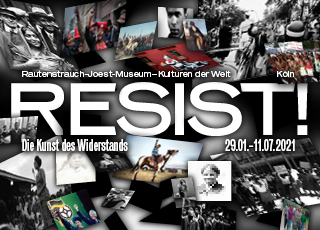 |
|
 |
|
|
|
|
Bon Voyage! Reisen in der Kunst der Gegenwart
Exposition collective
Du 13/11/2020 au 11/04/2021 à Aix-la-Chapelle (Allemagne)
Bon Voyage!
Travel. Hardly any other topic better reflects our current situation between lockdown and longing. Within closed borders and closed societies, when things that were taken for granted plummet into prohibitions, the desire to leave and break out grows. Rethinking is necessary. To find new ways, to test and take them – not only when travelling – is the challenge of our time.
With Bon Voyage! Travelling in Contemporary Art, the Ludwig Forum for International Art presents a selection of artistic positions that focus on travelling. We invite you to see the world through the eyes of the artists who often move off the beaten tourist tracks. The suitcases are packed with personal challenges, extreme experiences of political as well as climatic nature, fictional, and virtual mental journeys, and the last journey into the afterlife, which does without suitcases.
With around 100 works, the exhibition follows the routes of more than 60 artists and shows a selection of artistic positions from the 1960s to the present. Through paintings, installations, videos, objects, photographs, and prints, the exhibition provides an insight into the fascination and significance of travel in contemporary art at five stopovers.
Curator: Dr. Alexandra Kolossa
Curatorial assistance: Marie Gentges
Scientific volunteer: Stefanie Wagner
Lieu : Ludwig Forum für Internationale Kunst
https://bonvoyage.ludwigforum.de/en/category/bon-voyage-en/
|
|
|
|
|
|
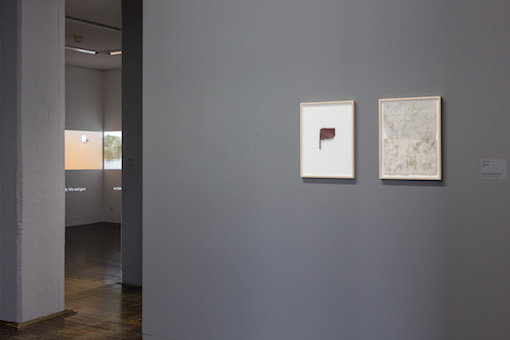 |
|
 |
|
|
|
|
Rue D'Alger
Exposition collective
Du 29/10/2020 au 21/12/2020 à Marseille
- Rue d’Alger --
Une proposition de TELEMMe en collaboration avec l' Istituto Italiano di Cultura di Marsiglia
, dans le cadre des Parallèles du Sud | Manifesta Biennial
13
Alessandra Ferrini, Nina Fischer & Maroan el Sani, Emma Grosbois & Agathe Rosa, Amina Menia, Mohammed Laouli, Muna Mussie
et une section consacrée aux archives de l’ex Casa d’Italia (Alessandro Gallicchio, Stéphane Mourlane et Caroline Pane)
> 29.10 - 21.12.2020 / Marseille
Rue d’Alger propose la réinterprétation d’éléments urbains marseillais renvoyant aux histoires coloniales, à partir du croisement des perspectives artistiques et de la recherche académique. Le projet investit l’Institut culturel italien (ex Casa d’Italia), exemple emblématique de l’architecture fasciste sur le sol français, en ouvrant les portes d’un lieu « dissonant », et en révélant les archives. Si Rue d’Alger questionne la propagande du rêve expansionniste mussolinien, il ne se limite pas à l’élaboration d’un discours uniquement centré sur l’Italie. Le positionnement de l’Institut culturel italien au cœur de la Rue d’Alger, invite en effet à élargir le propos aux héritages des relations asymétriques que la France a construit avec l’Afrique du Nord. L’exposition Rue d’Alger propose pour cela un dispositif polyphonique et pluriel, dans lequel les artistes et les chercheurs abordent, à travers différentes activités (performances, tables rondes, séminaires, etc…), les « fantômes » du passé colonial en revenant sur la construction de l’espace partagé et circulatoire que pourrait dessiner la Méditerranée d’aujourd’hui.
Rue d’Alger intends to reinterpret urban elements of Marseille that relate to colonial histories from the basis of intersections between artistic perspectives and academic research. The project takes over the Italian Cultural Institute (former Casa d’Italia), a representative example of fascist architecture in France, by opening the doors of a ‘dissonant’ place and revealing its archives. Although Rue d’Alger questions the propaganda in support of Mussolini’s expansionist dream, its discourse does not focus solely on Italy. The Italian Cultural Institute’s location at the heart of Rue d’Alger, naturally lends itself to a broadening of the subject to include the legacy of the asymmetric relations that France has constructed with North Africa. The Rue d’Alger exhibition proposes a polyphonic and plural platform for this, in which artists and researchers address, by way of various activities (performances, round tables, seminars, etc.), the ‘ghosts’ of the colonial past, while returning to the question of how to construct a shared, circulatory space that could characterise today’s Mediterranean.
Une proposition de TELEMMe ( Aix-Marseille Université
- CNRS
) en collaboration avec l’Institut culturel italien de Marseille, dans le cadre des Parallèles du Sud | Manifesta 13
Commissariat d’Alessandro Gallicchio avec Simone Frangi, Marine Schütz et Pierre Sintès, assistés de Léa Battais
Partenaires : AMU, MMSH, CNRS, Institut SoMuM, Banque Monte dei Paschi di Siena, Région Sud, ECHOES et Ancrages
Lieu : l’Institut culturel italien de Marseille
https://www.esteri.it/.../marsiglia-la-mostra-rue-d-alger...
|
|
|
|
|
|
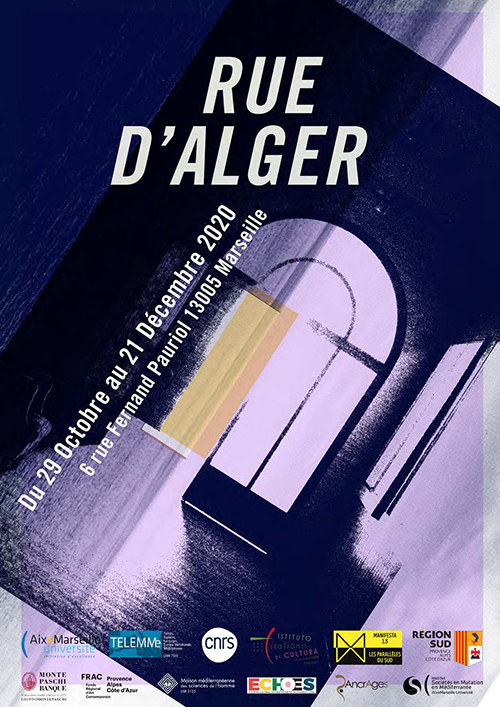 |
|
 |
|
|
|
|
Stress Rehearsal
Exposition collective
Du 28/10/2020 au 07/01/2021 à Vienne
with Mohamed Allam, Will Benedict, Daniel Mølholt Bülow, Gillian Brett, Rah Eleh, Rachel Fäth, Line Finderup Jensen mit Adnan Popovič, Juri Schaden & Parastu Gharabaghi, Lola Gonzàlez, Hanna Husberg & Laura McLean, Mohammed Laouli, Yein Lee, Elisabeth Molin, Jean Painlevé, Oliver Ressler, Clemens von Wedemeyer, Catherine Sarah Young
Closed until January 07, 2021 due to COVID-19 regulations
curated by Malou Solfjeld (Curator in Residence 2020)
Exhibition start: October 28, 2020, 4-9pm
Expressions of solidarity on balconies, grounded planes on international airfields, tales of a reviving non-human natural world – for many, the COVID-19 pandemic nurtures hopes for more communal, equal and caring futures. At the same time, however, the global health crisis gives reasons for more dystopian prospects of co-existence on this planet. Among other things, it further mobilises xenophobic sentiments and multiplies social inequalities. More so, it has thwarted the momentum of climate activism in the media to the extent that scholars like the French philosopher Bruno Latour have declared the pandemic a “dress rehearsal” for the exacerbating climate catastrophe ahead of us.
Deliberately emphasising and yet not isolating ecological queries and concerns, the group exhibition “Stress Rehearsal” zooms into the abyss; into the bushfire in Australia, oil tanks sinking into the ocean, into the sea level rise on the Maldives and open landfills in Morocco. It brings together works by an international cohort of artists to critically reflect on the entanglements of the global pandemic, climate crisis, mass extinction, social inequality and turbo-capitalism. Gathering a hybridity of perspectives from the past, present and future, “Stress Rehearsal” collapses the linearity of time in order to activate our senses in the here and now. What is our individual as well as our collective responsibility towards more livable futures? What kind of new forms of agency do we need to craft in order to co-shape worlds-in-common – on- and offline, with the living and the non-living?
The exhibition unpacks questions like these in three different sections; We created this beast (referring to Bram Ieven and Jan Overwijk’s eponymous text), The pandemic as a dress rehearsal (in line with Bruno Latour’s essay Is this a dress rehearsal?) and The pandemic is a portal (alluring to Arundhati Roy’s eponymous article). The latter division is conceived as a laboratory of sorts, an accumulating digital archive of links and texts, videos and images. It serves as a multi-vocal platform where artists, curators, scholars, activists and visitors alike are invited to contribute and negotiate visions and perspectives on how to live together otherwise. The show consciously hosts a majority of video works as a means to reflect on contemporary modes of perception and consumption. It has been developed by the curator Malou Solfjeld with the support of Alexandra Grausam, Aline Lenzhofer and Frederike Sperling from das weisse haus team.
Lieu : das weisse haus
https://w.dasweissehaus.at/en/exhibition/gruppenausstellung-stress-rehearsal/
|
|
|
|
|
|
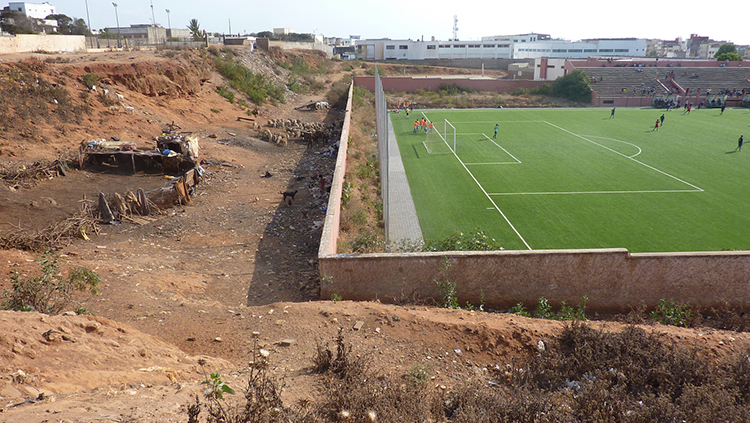 |
|
 |
|
|
|
|
Croyances, Faire et défaire l'invisible
Exposition collective
Du 12/03/2020 au 20/01/2021 à PARIS
Avec l’exposition Croyances : faire et défaire l’invisible, l’ICI et Afrique in Visu interrogent la puissance évocatrice des religions, superstitions et mythes du continent africain, revendiqué par les artistes comme lieu d’expérimentation, de glissements, de frictions et de négociations.
Loin du panorama et des récits stéréotypés, seize photographes et vidéastes se saisissent de façon poétique, critique ou décalée de la question du « croire », de ses conventions, pratiques et représentations. Leurs œuvres dialoguent entre réel et fiction, esquissant des croyances en mouvement, imaginant leurs connections et leurs évolutions au fil d’une « pensée archipélique ». Elles détournent l’incarnation de l’autorité religieuse pour résister aux schémas dominants, inscrivent le culte vaudou dans la mémoire de l’esclavage, rapprochent la dévotion des pèlerins et la résilience individuelle, transforment les rites traditionnels à l’ère digitale, captent les vibrations de la transe et les mystères de l’envoûtement…
Lieu : L'institut des Cultures D'islam
https://www.institut-cultures-islam.org/croyances-faire-et-defaire-linvisible/
|
|
|
|
|
|
|
|
 |
|
|
|
|
Artist talk
Conférence, performance, événement...
Le 13/03/2019 à Rabat/Maroc
Dans le cadre de cette soirée, Mohammed Laouli présente son projet au long cours, Ex-voto.Avec ce travail, Mohammed Laouli ouvre des pistes de réflexions autour de la colonisation et de sa relation avec la situation présente.
En confrontant les remerciements liés aux principes des Ex-votos avec la mise en lumière de situations quotidiennes actuelle, l’artiste dénonce l’ambivalences des discours officiels et la violence du présent postcolonial.
Cette soirée prend place dans le cadre de travelling narratives, un programme régional d’art et de recherche souhaitant encourager les interactions entre des acteurs culturels au Maroc, Algérie, Egypte, Mauritanie et Libye.
Lieu : Le cube independent art room
https://lecube-art.com
|
|
|
|
|
|
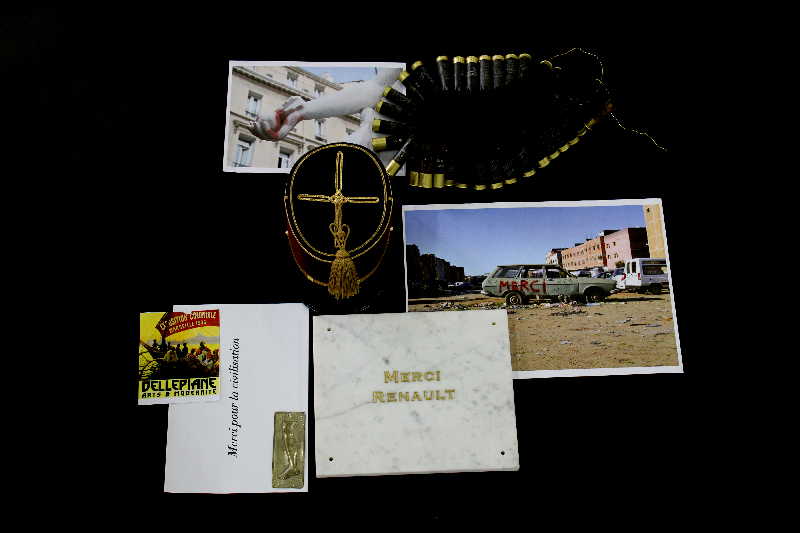 |
|
 |
|
|
|